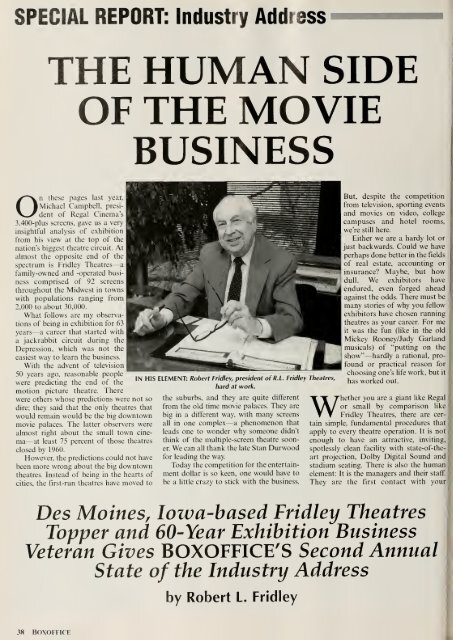Boxoffice-January.2000
You also want an ePaper? Increase the reach of your titles
YUMPU automatically turns print PDFs into web optimized ePapers that Google loves.
SPECIAL REPORT: Industry Add! ass<br />
THE HUMAN SIDE<br />
OF THE MOVIE<br />
BUSINESS<br />
these pages last year,<br />
OnMichael Campbell, president<br />
of Regal Cinema's<br />
3,400-plus screens, gave us a very<br />
insightful analysis of exhibition<br />
from his view at the top of the<br />
nation's biggest theatre circuit. At<br />
almost the opposite end of the<br />
spectrum is Fridley Theatres—<br />
family-owned and -operated business<br />
comprised of 92 screens<br />
throughout the Midwest in towns<br />
with populations ranging from<br />
2,000 to about 30,000.<br />
What follows are my observations<br />
of being in exhibition for 63<br />
years—a career that started with<br />
a jackrabbit circuit during the<br />
Depression, which was not the<br />
easiest way to learn the business.<br />
With the advent of television<br />
50 years ago. reasonable people<br />
were predicting the end of the<br />
motion picture theatre. There<br />
were others whose predictions were not so<br />
dire; they said that the only theatres that<br />
would remain would be the big downtown<br />
movie palaces. The latter observers were<br />
almost right about the small town cinema—<br />
at least 75 percent of those theatres<br />
closed by 1960.<br />
However, the predictions could not have<br />
been more wrong about the big downtown<br />
theatres. Instead of being in the hearts of<br />
cities, the first-run theatres have moved to<br />
ELEMENT: Robert Fridley, president of R.L. Fridley Theatres,<br />
hard at work.<br />
the suburbs, and they are quite different<br />
from the old time movie palaces. They are<br />
big in a different way, with many screens<br />
all in one complex—a phenomenon that<br />
leads one to wonder why someone didn't<br />
think of the multiple-screen theatre sooner.<br />
We can all thank the late Stan Durwood<br />
for leading the way.<br />
Today the competition for the entertainment<br />
dollar is so keen, one would have to<br />
be a little crazy to stick with the business.<br />
But. despite the competition<br />
from television, sporting events<br />
and movies on video, college<br />
campuses and hotel rooms,<br />
we're still<br />
here.<br />
Either we are a hardy lot or<br />
just backwards. Could we have<br />
perhaps done better in the fields<br />
of real estate, accounting or<br />
insurance? Maybe, but how<br />
dull. We exhibitors have<br />
endured, even forged ahead<br />
against the odds. There must be<br />
many stories of why you fellow<br />
exhibitors have chosen running<br />
theatres as your career. For me<br />
it was the fun (like in the old<br />
Mickey Rooney/Judy Garland<br />
musicals) of "putting on the<br />
show"—hardly a rational, profound<br />
or practical reason for<br />
choosing one's life work, but it<br />
has worked out.<br />
Whether you are a giant like Regal<br />
or small by comparison like<br />
Fridley Theatres, there are certain<br />
simple, fundamental procedures that<br />
apply to every theatre operation. It is not<br />
enough to have an attractive, inviting<br />
spotlessly clean facility with state-of-theart<br />
projection, Dolby Digital Sound and<br />
stadium seating. There is also the human<br />
element: It is the managers and their staff.<br />
They are the first contact with your<br />
Des Moines, Iowa-based Fridley Theatres<br />
Topper and 60-Year Exhibition Business<br />
Veteran Gives BOXOFFICE'S Second Annual<br />
State of the Industry Address<br />
by Robert L.<br />
Fridley<br />
.38 BOXOF1 l< t

















